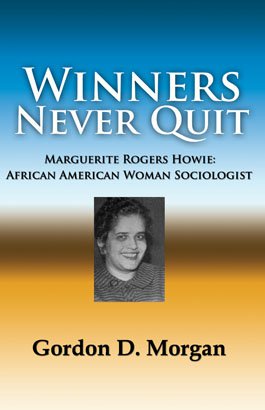
About the Author
Gordon D. Morgan is University Professor at the University of Arkansas, Fayetteville. His writings have spanned many aspects of the African American and Diasporian experience. His work and research have carried him to the Far East, Africa, the Caribbean, and Europe. He has received fellowships from Ford, Russell Sage American College Testing Program, and from the National Endowment for the Humanities.
WINNERS NEVER QUIT: Marguerite Rogers Howie, African American Woman Sociologist
Gordon D. MorganNew Academia Publishing, 2006
172 Pages
ISBN 0-9777908-9-4 Paperback
For BULK ORDERS, order directly from New Academia Publishing.
Queries: orders@newacademia.com
About the Author
Gordon D. Morgan is University Professor at the University of Arkansas, Fayetteville. His writings have spanned many aspects of the African American and Diasporian experience. His work and research have carried him to the Far East, Africa, the Caribbean, and Europe. He has received fellowships from Ford, Russell Sage American College Testing Program, and from the National Endowment for the Humanities.
About the book
The life of Marguerite Howie, a second-generation sociologist, may provide insight into how society worked at the intersection of class, race, and gender.
Praise
“This book chronicles and captures the essence of the tribulations experienced by Black scholars and faculty in higher education from the 1900s to the present… Hundreds of Black scholars of Higher Education (including this reader) can relate to, and identify with, Professor Morgan’s comprehensive research and the history he has covered.”
-Talmadge Anderson, Professor Emeritus, Washington State University.
“Little has been written on the life of African-American scholars working in traditionally black colleges and less has been written on the struggles of African-American women scholars. This work provides a lens through which we are able to get a glimpse of the struggles, divisions, conflicts, tensions, and solidarity that characterized African-American faculty at traditionally black colleges in the South. Just as macro-level history is most accessible through the close examination of one person’s experiences in a particular social-historical context, so too the tensions at historically black colleges, the concerns of black intellectual elite, and the status of structure of the black academic community during the time of the desegregation of white colleges, all come alive in Professor Morgan’s work.”
-Steven Worden, Associate Professor of Sociology, University of Arkansas.





 Coming Soon
Coming Soon Awards
Awards